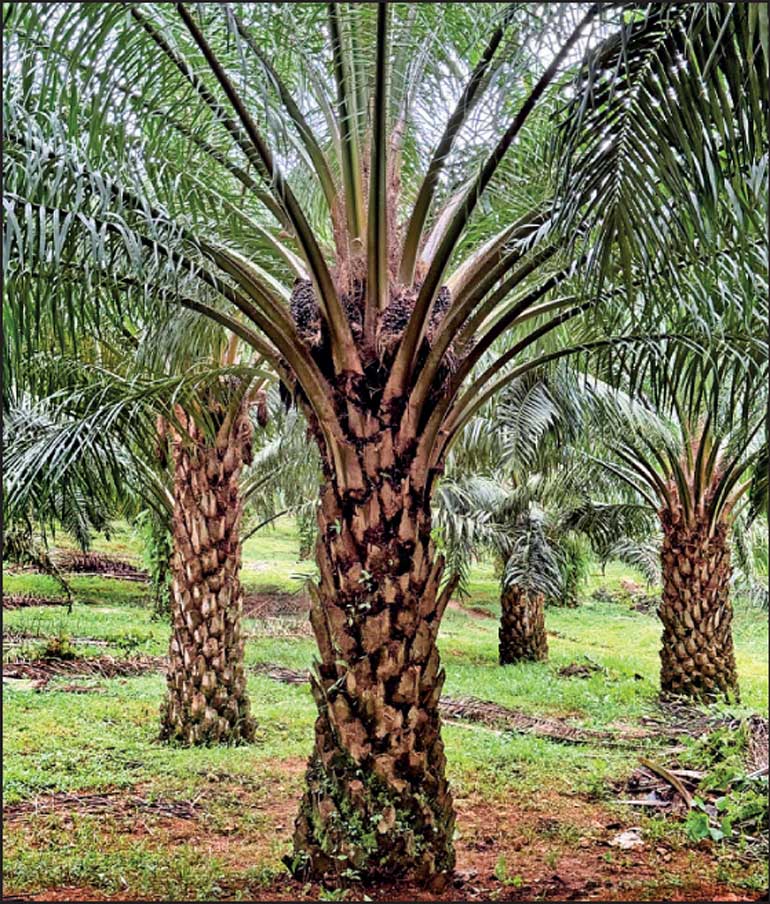Wednesday Feb 25, 2026
Wednesday Feb 25, 2026
Friday, 12 September 2025 00:00 - - {{hitsCtrl.values.hits}}

The Planters’ Association of Ceylon (PA) yesterday renewed its call on the Government to urgently reverse the ban on oil palm cultivation, saying it is key to boosting growth in the plantation industry and raising worker incomes.
According to the Association, following the Government’s abrupt ban on oil palm cultivation in 2021, this lucrative crop that was once considered the nation’s most valuable strategic diversification instead became a symbol of policy inconsistency and lost economic opportunity.
Oil palm cultivation was first introduced to Sri Lanka in 1968, but only began to gain traction in the early 2000s when Regional Plantation Companies (RPCs) sought alternatives to loss-making rubber. Recognising the crop’s immense potential, the Government at the time promised to extend tax concessions for new oil palm cultivations in 2009, and even formally endorsed the expansion of plantations up to 20,000 hectares by 2016.
Encouraged by these strong positive signals from the Government at the time, plantation companies such as Watawala, Namunukula, Elpitiya, Agalawatte, Horana, Kegalle, Malwatte Valley, and Kotagala invested billions in nurseries, milling facilities, and research.
The Association noted that despite these expansions being strictly restricted to marginal and degraded rubber lands, and nearly six prior decades of oil palm cultivation in Sri Lanka without any notable documented instances of negative environmental impacts, the expansion of oil palm cultivation faced persistent opposition from a variety of vested interests.
The PA said the 2021 ban has already led to the destruction of over Rs. 550 million worth of seedlings, with nurseries fully written off. Additionally, the policy reversal has placed approximately Rs. 23 billion in investments, including plantations, mills, and future revenue across the sector, at serious risk, all without any form of compensation.
“This was particularly damaging because palm oil was by far the most profitable crop in the sector, delivering average net margins of 49% and contributing in some cases to more than half of RPC profits. The abrupt prohibition has eroded profitability, diminished investor confidence, and crippled a once-thriving segment of the industry,” PA Secretary General Lalith Obeyesekere said.
The PA notes that more than 5,000 direct jobs and 21,000 dependent livelihoods were tied to the sector, with oil palm workers earning nearly double the wages of their counterparts in tea and rubber.
The industry contributed over Rs. 2.5 billion annually to plantation households, providing a steady source of income in regions where poverty is deeply entrenched. Its sudden halt has pushed many families into financial insecurity at a time when the national economy is already under strain.
The ripple effects have been felt across industries as well. Refiners and manufacturers who depended on steady supplies of local crude palm oil now face delays, higher costs, and heavy reliance on imports secured through cumbersome licencing.
The bakery and confectionery industry, valued at over Rs. 200 billion, has suffered shortages and price hikes in staples such as bread, biscuits, and margarine. Pharmaceuticals, personal care, and industrial sectors have also been disrupted, leaving bottlenecks that impact both businesses and consumers, according to the PA.
The ban has also deepened Sri Lanka’s foreign exchange crisis. Annual consumption of edible oils is around 264,000 metric tons, yet local production meets only a quarter of this demand.
The shortfall is covered through imports, costing an estimated $ 35 million annually in lost reserves, the PA said, adding that substituting with coconut oil undermines a lucrative export industry that earned $ 63 billion in 2020. Over five years, the ban could cost more than $ 175 million in foreign exchange, which is an unsustainable burden for a nation in economic recovery.
The PA argues that the environmental concerns, often used to justify the policy, are largely misplaced in the Sri Lankan context.
Globally, palm oil is recognised as the most efficient oil crop, producing 40% of vegetable oil on just 6% of land. Countries like Malaysia and Indonesia have embraced cultivation while enforcing sustainability standards such as the Roundtable on Sustainable Palm Oil (RSPO) and Indonesian Sustainable Palm Oil (ISPO) certifications, smallholder integration, and zero-waste technologies.
In Sri Lanka, oil palm was grown mainly on old rubber lands that had already completed their economic cycle, and not on virgin forests. With the right regulatory framework and commitment to global best practices, Sri Lanka could develop a sustainable palm oil sector without environmental compromise.
Palm oil’s nutritional and health benefits are another overlooked dimension. Naturally trans-fat free, rich in vitamin E and antioxidants, and widely used in food manufacturing, palm oil offers a healthier alternative to hydrogenated oils. Recognised by the World Health Organisation (WHO) and the World Wide Fund for Nature (WWF), when produced responsibly, it is a proven, safe, and efficient choice for food security, the PA pointed out.
Sri Lanka can revive its palm oil sector by lifting the ban and adopting sustainability standards, integrating smallholder farmers, reforming import taxation, and investing in research and development (R&D) and traceability systems.
The PA argues that India has already moved decisively in this direction, expanding palm oil cultivation by 45% in five years, with ambitious plans to reach 1.7 million hectares by 2030. Sri Lanka, with ideal growing conditions, is well-positioned to follow this example.
Sri Lanka’s palm oil ban has inflicted avoidable wounds on plantation companies, rural households, industries, and the national economy. Yet, the potential for revival remains. With global best practices readily available, palm oil could be harnessed as the foundation of agricultural diversification, food security, and foreign exchange income.
“We urge the Government to reconsider its stance and embrace palm oil as a core strategy for the revival of the plantation industry. At this decisive moment, Sri Lanka cannot afford to ignore such a golden opportunity,” the PA said.